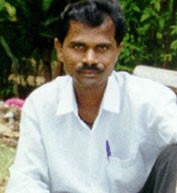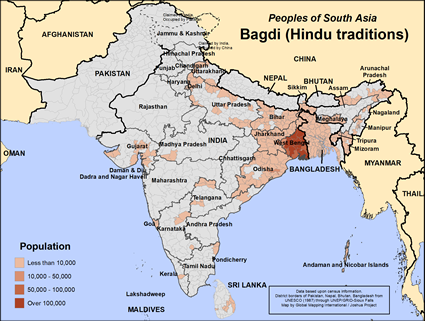Bagdi (Hindu traditions) in India

Photo Source:
Copyrighted © 2026
India Missions Association All rights reserved. Used with permission |

Map Source:
People Group data: Omid. Map geography: UNESCO / GMI. Map Design: Joshua Project.
|
| People Name: | Bagdi (Hindu traditions) |
| Country: | India |
| 10/40 Window: | Yes |
| Population: | 2,923,000 |
| World Population: | 3,010,000 |
| Primary Language: | Bengali |
| Primary Religion: | Hinduism |
| Christian Adherents: | 0.09 % |
| Evangelicals: | 0.05 % |
| Scripture: | Complete Bible |
| Ministry Resources: | Yes |
| Jesus Film: | Yes |
| Audio Recordings: | Yes |
| People Cluster: | South Asia Dalit - other |
| Affinity Bloc: | South Asian Peoples |
| Progress Level: |
|
Introduction / History
The Bagdi people were an important Hindu Bengali warrior caste. The word Bagdi comes from the word Barga which indicates their warrior status. In return for their military service the Bagdi were given land to cultivate. During the colonial period the Bagdi lost almost all of their land when the British disbanded the local armies. The some Bagdi joined the colonial army while others became fishermen, boatmen and landless agricultural workers. Bagdi caste members are found in India and Bangladesh. The large majority of Bagdi live in West Bengal and speak Bengali are their main languages. Smaller groups of Bagdi live in the nation of Bangladesh. Many resources are available in Bengali including a complete Bible. Unfortunately, many Bagdi are illiterate so the gospel will need to be shared in visual and oral forms.
What Are Their Lives Like?
The Bagdi now are considered to be the fourth Hindu caste of workers. Most of the Bagdi live in poverty. Some reside in villages without electricity, clean water and access to modern medicine. The few educated Bagdi have taken government jobs and work as administrators, teachers, businesspersons and in medicine. The Bagdi marry within their group. Families arrange marriages. Sons inherit property upon their father's death. A caste association decides legal disputes and promotes their interests. Children often quit school after a few years to help their parents earn a living.
What Are Their Beliefs?
The Bagdi practice Hinduism, the ancient religion of India. They worship and serve the gods of the Hindu pantheon. Hindus believe that by performing rituals and good works that they will attain moksha or freedom from the endless cycle of birth, death and rebirth. The Bagdi visit Hindu temples and offer prayers, food, flowers, and incense to their gods in hopes of gaining protection and benefits. They do not have a personal or familial relationship with their gods as Christians do. There are many forms of Hinduism, each with its own deities and beliefs. The main yearly holidays of the Bagdi people are Holi, the festival of colors and the start of spring, Diwali, the festival of lights, Navratri, the celebration of autumn and Rama Navami, Rama's birthday. The caste system divides Hindus into four main categories. The lowest communities are outside of the caste system. The Bagdi fit into the worker caste.
What Are Their Needs?
The Bagdi people need to learn new job skills in order to escape their poverty. Their children need good schools. The Bagdi who live in rural villages often need access to clean water and modern medicine. Most of all the Bagdi need to hear about the good news of Jesus Christ. He alone can forgive their sins and give them the hope of eternal life.
Prayer Points
Pray that Bagdi parents are able to provide adequately for their children. Pray that the Bagdi have a hunger for spiritual truth and a desire to investigate the claims of Christ. Pray for the Lord to send workers to the Bagdi people to help them with their spiritual and physical needs.